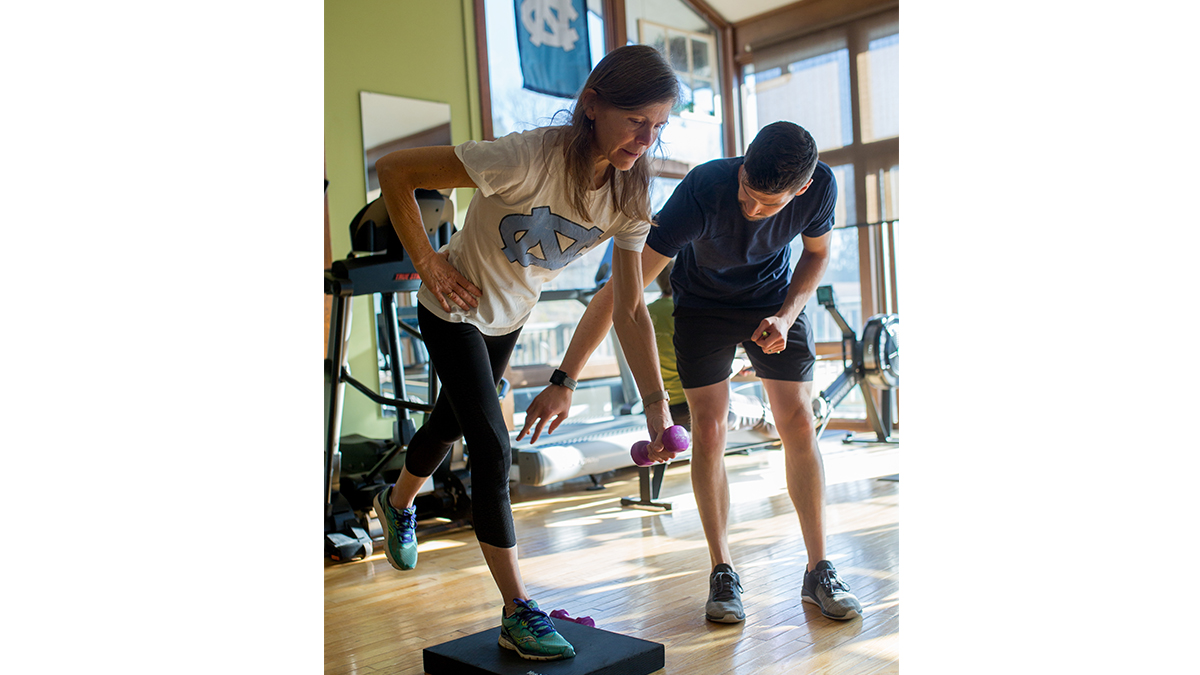Exercise program helps patients manage cancer symptoms
Carolina professor Claudio Battaglini traded in a career coaching world-class athletes to train cancer patients and survivors, helping them live longer and healthier lives.

Cathy Huffman was never an exercise person, and she was never a support group person, either.
So, when she joined an “exercise support group” after finishing treatment for ovarian cancer in 2015, she was a little surprised by how much she loved it.
Four years after her treatment, she credits that group — UNC-Chapel Hill’s Get Real and Heel — for both her health and some of her closest friendships.
“I really do think it keeps the cancer at bay,” she said. “I think it reduces the possibility of recurrence. And it also helps you cope. There’s just no question about it.”
Get Real and Heel is a fitness group for cancer patients and survivors. It has been part of the Lineberger Comprehensive Cancer Center’s holistic support programs for more than a decade, having served more than 1,000 patients since 2006.
For program director Claudio Battaglini, the path to founding Get Real and Heel was full of twists and turns.
A different kind of athlete
Before he became a professor of exercise physiology in the College of Arts & Sciences exercise and sports science program and before Get Real and Heel, Battaglini wasn’t interested in exercise oncology at all. In fact, he didn’t even know exercise oncology existed.
He was a soccer star, the coach of a world-championship team in his native Brazil, and he dreamed of coaching athletes all the way to Olympic glory. When he took a job coaching the Brazilian triathlon team in the mountains of Colorado, life threw Battaglini a curveball.
“I want you to train a cancer patient,” said a faculty member at the University of Northern Colorado who he met while he was wandering the halls one day.
Battaglini was surprised by the request.
“I said, ‘No, no, no. I don’t want anything to do with this. That’s not what I do. I train some of the strongest guys in the world.’ But how could I say no?”
He agreed to meet the patient. She was his age, only 24, and battling brain cancer.
“When I met her, she was very pale, very weak,” Battaglini remembered. “She said, ‘The doctors gave me six months to live, and two have already passed, so can we get started?’ I said, ‘Alright, let’s go.’”
Battaglini began to train her, using physical fitness as a tool to improve her quality of life and help her regain strength after chemotherapy treatments. She lived for two and a half more years. At one point, her cancer even disappeared.
“It was incredible. It shocked me,” Battaglini said. “And it started raising questions in my mind: How much does exercise impact patients’ quality of life and impact their survival long term? So, believe it or not, right then I ended up changing careers.”
Optimizing patient care
In her honor, Battaglini’s career in exercise oncology was born. When he got a call from the University of North Carolina at Chapel Hill asking him to interview for a teaching position in the department of exercise and sport science, he jumped at the opportunity.
“I said, ‘I don’t remember applying for any job,’” Battaglini said, laughing. “But I knew of the Lineberger Comprehensive Cancer Center, and, of course, it’s a great University with great sports teams. And here I am almost 15 years later.”
Since then Battaglini has worked with hundreds of UNC Hospitals patients, hoping to offer them a better quality of life through exercise — everything from stationary biking and stair-stepping to weight training and balance exercises.
“One of our main goals is to help them regain their strength, their endurance, and give them the support that they need to live a healthy life for many, many years to come,” he said.
Huffman believes the program has done just that.
“It’s just amazing,” she said. “The benefits – not only of the physical exercise but the benefits mentally – have been amazing. Being with a small group of people who understand what you’ve been through and what you’re going through, it really helps.”
As the program continues to grow, the Get Real and Heel team is working to quantify the impact of exercise on recovery so that one day exercise therapy can become a fundamental part of cancer care.
The program’s upcoming telehealth feature, which will connect off-site patients with trainers via a computer screen, will also help Get Real and Heel reach patients in rural areas of North Carolina who might not otherwise have access to this type of support.
As for Battaglini, the decision to trade in Olympic medals for the reward of helping patients live their fullest and healthiest lives was one of the best he’s ever made.
“I love the Olympics, I love the gold medals, but in the big scheme of things, I made the right choice,” he said. “I feel that I contribute to this community and the pursuit of better treatment for cancer patients. If I can be one of the contributors to optimizing patient care, that’s the reward. Giving them hope — that’s amazing.”




